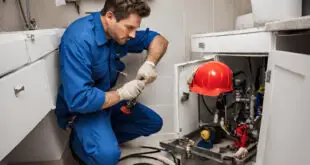In most households, plumbing is often seen as a complex endeavor that is confusing to many people. However, you can decide to take the broad step of learning a few residential plumbing logistics.
A lot of people spend a lot of money hiring professional plumbers. With the right tools, many of these plumbing needs can be a DIY.
BASICS OF PLUMBING
Plumbing logistics may seem very complicated but it is not. Basically, there are only two parts in the system supply system for water that is incoming and the drainage system that gets rid water that is un There are, however, some major plumbing issues that will require the services of a certified professional plumbing company.
In order to be able to fix minor plumbing issues that may arise, one has to follow the following set of guidelines.
- Do not be afraid to change parts

This is especially true for the toilets and faucets. Worn out flappers are the common culprits when it comes to toilet tank drips. The best thing is that replacing them is easy. It involves removing a screw here and there. The hardware parts are cheap and readily available.
There are other components like sinks that are also messier. Taking apart pipes under the sink, if not careful, can lead to large water spillages. Thus, a lot of care and manufacture directions should be taken.
- Do not fix your garbage disposal with bare hands

Garbage disposals are dangerous whether they are turned on or off. The best thing would be to scout online for some advice on how to troubleshoot it.
- Make a habit of preventing problems before they occur

The above statement is true if you do not want to spend a lot of money fixing plumbing issues. One of the most common plumbing problems is clogged drainage systems. The main culprit that is mostly responsible for clogged drainages is hair among other things. This can be prevented if only people used drain covers or screens. These prevent hairs and other unwanted substances from going into the drain. In cases of clogs, it would be easier to remove the screen than try to clear the drain.
- Carefully check your toilet base for any damages caused by leaks

Floor weakness can be easily checked. Place one foot on each side of the toilet base the rock back and forth. The earlier you catch floor damage, the better. The more you wait, the more complex and expensive the repair will be.
- Remove clogs

When the sink starts to drain slowly, it is best for one to unclog it. This is best done without the use of expensive harmful chemicals. Use a drain snake. This is done by inserting the drain snake into the sink and pulling it back. The drain snake will most probably come out with the material that was clogging the sink.
- Run cold water through the garbage disposal

Most people use hot water for this but it is wrong. Running hot water will liquefy the grease and it will spread everywhere in the drains. Use cold water instead as it will encourage a smoother drain.
- Check the showerhead for complications
The most effective and easiest way to cater to the annoying showerhead and tap leakages is using thread tape. The best way to go about it is by unscrewing the showerhead and placing new thread tape in it then screwing it back to position.
While at it, check for clogged showerhead pores. In case this is the situation, soak the showerhead in warm water that is mixed with vinegar. Then use a soft brush to scrub off unwanted mineral deposits.
- Make your water heater more cost effective and efficient

Have a look at your water heater and adjust temperatures accordingly. Going down to temperatures of 115 degrees could still be effective in getting you enough hot water for your daily needs.
Another way is to insulate your water heater. This allows the heater to preserve more heat. Insulating blankets are sometimes offered for free or purchased at cost-effective prices.
If you are using a well, take extra caution not to have your water full of sediment. These sediments cause water heaters to run less efficiently. The best thing to do would be to drain off the water from the tank and into buckets, then remove the sediments that are most likely to have settled at the bottom of the tank.
- Pump your septic tank at least once every five years
This is crucial in order for the septic tank to remain in optimum condition. It also prevents a buildup of sediments. This will, however, require the services of a plumbing expert. It will be costly but it will be only a fraction of the cost you will require if the tank gets damaged or inoperable.
Being a plumber for small projects is not a hard task. It may save you a lot of money. There are also bigger plumbing issues that will be very tasking. These will need the services of a certified and reputable plumber. So, it is always good to have a plumber’s number for large projects.
I hope that you find the above tasks easy and opt to do them yourself the next time you have a leak.
 A Very Cozy Home Home Decor Tips and Ideas
A Very Cozy Home Home Decor Tips and Ideas 